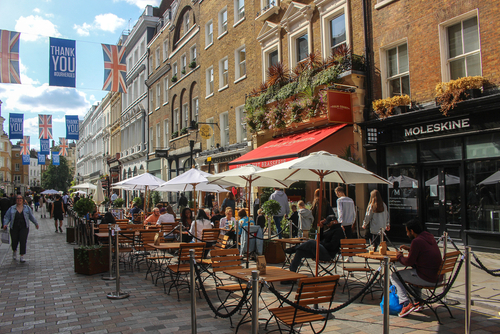Off the menu? UK alfresco dining faces autumn dilemma
Councils are considering whether to continue the emergency alfresco dining Covid measures for hospitality firms.
It is mid-morning in London’s Soho, and the outdoor tables at many cafes and restaurants are already buzzing with regulars.
It is an alfresco dining scene that is set to change next month when Westminster council ends its scheme of evening road closures and pedestrianised streets that has turned parts of central London into a giant European-style outdoor bistro.
Sophie Hayes, a regular at the French-style cafe Maison Bertaux, has loved the move to dining in the fresh air. As has Bertie King, the assistant manager of the Ducksoup restaurant on nearby Dean Street, who says its outdoor tables have almost doubled the business’s capacity.
“We are wishing that it wasn’t ending,” she said. “We already can’t have umbrellas and [after September] we can only have one table out front. We have spent a lot of money on heaters and brollies and outdoor tables. Some people aren’t ready to sit inside yet.”
While outdoor dining has been popular with hospitality businesses and their clients, residents say the council must stick to its promise of ending the road closures this month. They say large-scale alfresco dining and drinking has created intolerable noise and disruption from revellers and by pushing businesses’ deliveries and rubbish collections into the early hours of the morning.
As autumn approaches, Soho’s quandary is being repeated in towns and cities across the UK as councils, businesses and residents consider whether emergency measures to facilitate outdoor dining should continue.
In March, the communities secretary, Robert Jenrick, announced he would extend temporary provisions on pavement licences, including lower fees and much shorter consultation periods, until September 2022 to help the hospitality industry recover.
However, many councils did not consult with local people on the road closures and other emergency measures introduced to facilitate outdoor dining during the pandemic to help businesses not allowed to trade indoors, or barely able to do so because of the requirements of social distancing.
With the arrival of autumn, Birmingham says it will be reviewing its temporary road closures and pavement widening on a case-by-case basis, suggesting plans to scale back on outdoor dining.
Manchester, where 350 pavement licences have been granted by the council, is keeping some road closures – Thomas Street and part of Ducie Street in the Northern Quarter will be permanently closed to traffic. However, the pedestrianisation of nearby Stevenson Square, Shudehill and Withy Grove as well as the part pedestrianisation of Deansgate are subject to further public consultation.
Sacha Lord, the night-time economy adviser for Greater Manchester, said: “These schemes were vital to the businesses who were trying to trade during the pandemic, and will continue to be imperative as the sector recovers.
“Manchester’s weather issues are well known however, and a move for permanent outdoor trading would be difficult to implement year round.”
However in Liverpool, Newcastle and parts of London including King’s Cross, where 1,500 alfresco seats have sprung up since the start of the pandemic, the plan is to renew pavement licences to enable restaurants to trade outdoors into the winter.
Harry Doyle, Liverpool council’s cabinet member for culture and visitor economy, says its Liverpool Without Walls initiative, which generated almost £9m of income for businesses that they would not otherwise have taken, will continue.
“This sector is hugely important to the city and we are pleased to say we are in the process of renewing pavement licences to enable outlets to continue to welcome customers with their outdoor model.”
Newcastle city council, which has 151 premises with permission for pavement cafes, said it had no plans to prevent them from continuing to trade outdoors.
“The increased number of pavement cafes in the city has been a real positive at what has been very difficult time for our hospitality trade,” a spokesperson said.
Westminster, which created more than 16,000 outdoor seats for the hospitality sector, says its road closures, which made space for additional outdoor dining in the streets of Marylebone, Covent Garden and St John’s Wood as well as Soho, were always intended to be temporary. It says businesses can still apply for pavement licences on existing footways and it will consult with residents and businesses about longer-term schemes to facilitate additional outdoor dining.
“While the [road closure] schemes were extended three times, now is the point at which we need to consult residents on whether or not they should continue, and the colder and rainier months are the best time to do that,” a spokesperson said.
Tim Lord, the chair of the Soho Society, which represents local residents, says they are desperate for change: “People quite like street dining. It is one thing during the day, but if you were here at two in the morning you would see something extraordinary. We have at least 2,000 additional people in the streets. It is meant to finish at 11pm but there is no mechanism to encourage people to go home.”
He says the takeover of the streets by restaurants and bars is a “massive transfer of a valuable public asset from shared public use to private commercial gain with no transparency on how the council decided to do that”.
The original version of this article was first published in The Guardian
We are a catering and hospitality recruitment company. We can support you to find a new role or the staff you need to grow your business.

